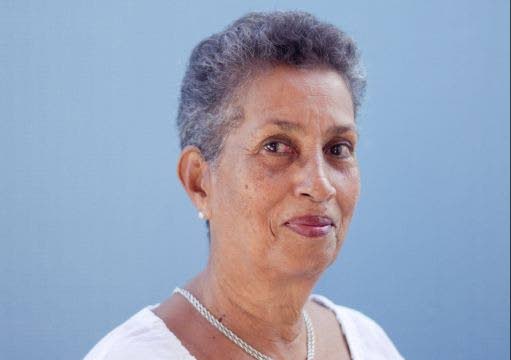The wrongest title

BC PIRES reviews Barbara Jenkins’ novel De Rightest Place
The longer and more eagerly you wait for something, the greater the chance of disappointment. With 17 years between Use Your Illusion and their next album, for example, Guns ‘N’ Roses extended their fans’ breathless anticipation for so very long that Chinese Democracy could only asphyxiate before release.
Since her short story collection, Sic Transit Wagon, appeared in 2013, then, I’ve been looking forward to Barbara Jenkins’ first novel.

Now, you can’t judge a book by its cover – though any writer would be lucky to have an Alex Smailes photograph on hers – and you perhaps ought not to judge one by its title, but De Rightest Place had to be the wrongest title.
From the earliest possible start, from the deliberate choice of “De” instead of “The,” this book seems to go wrong because of the writer’s own decisions.
That titular “De” places the whole book immediately and squarely in a world in which Trinidadian dialect is paramount – but the book itself does not honour that commitment. Had it been named “The Right Place,” the voice might have been negotiable, and De Rightest Place might not have read quite so wrongly the moment it departed from the single voice its title declared.
The problem is compounded from beginning to end because the story itself is bookended, as it were, by the observations, in prologue and epilogue, of I-Cynthia, Belmont Maco, a first-person narrator, who appears intermittently but speaks consistently in the “correct” dialect voice of De Rightest Place.
Even if you cut Jenkins some slack and declare that the “De” in her title is not delimiting, but merely permissive, and that she is free to write the same story from several different points of view, the book remains fundamentally flawed: it is perfectly okay for different characters to speak in different voices, once they do it consistently and the reader is not required to suspend judgement as well as disbelief. Only I-Cynthia even comes close to managing this task. The voice of every other character – the way in which the writer herself chooses words to depict the character – shifts, from paragraph to paragraph, sometimes from phrase to phrase, from Trinidadian dialect to Standard English, from omniscient to neutral, from illiterate to literati, from patient to exasperated, from worldly wise to naive, for no discernible reason at all, apart possibly from the author’s own convenience.
When he is scrambling to get his story out of his head and on to the page before he loses its thread, the writer may fling words at his page like spaghetti at a wall in the hope that a lot will stick – but then the writer (or his editor) is duty-bound to patiently taste each strand and deliberately toss out every one that is not al dente.
This appears not to have happened with De Rightest Place.
In the following paragraph, for instance, the sympathetic reader baulks at accepting “we” as common or garden, uneducated “fellers and them” from Belmont who, somehow, are au courant with “authoritative diction, precise enunciation and modulated pitch” and the author herself trails off in her search for a voice the way her character does in his search for the right word:
“KarlLee hear the voice. Afterwards, when we heckling him, the fellers and them say he heed the call. Its authoritative diction, precise enunciation and modulated pitch register in every listening ear, is true, but, according to KarlLee, it pick him out special, tunnelling into his ear canal, reverberating on the drum, vibrating the little bones, coursing through the cochlea and semi-circular canals…then leap the synapse into the auditory nerve and startle his brain in a frisson of …he can’t tell…all his years and years of experience can’t tell him what.”
Bad writers may be lucky to get their weak books into print, but good writers are cursed to get their books into print before they are properly done. De Rightest Place seems to me to be a strong first draft, but a long way from what the finished product ought to have been.
One of the things De Rightest Place could have been, instead of a fatally flawed novel, was a second strong collection of short stories – but that would have required a firmer hand, either her own, or that of a ruthless editor. The I-Cynthia narrator could have come into her own by discharging, in between each short story, the duty she declared for herself in the prologue (but didn’t manage): that of bringing all of Belmont together in the rightest place.
The other characters would also have benefited, since all of them could hold their own, perhaps even dominate, in a short story, but none of them is strong enough, or developed sufficiently well by Jenkins, to hold reader interest for a whole novel. In a short story, for example, the revelation hinted at by a birthmark might have become a spine-tingling denouement; at novel length, telegraphed far in advance, its impact is minimal.
Regretfully, Barbara Jenkins’ first novel does not fulfil the promise of her first short story collection. There are many portions of it that are beautifully written; but, then, there are three or four great songs on Chinese Democracy.
De Rightest Place is published by Peepal Tree Press

Comments
"The wrongest title"